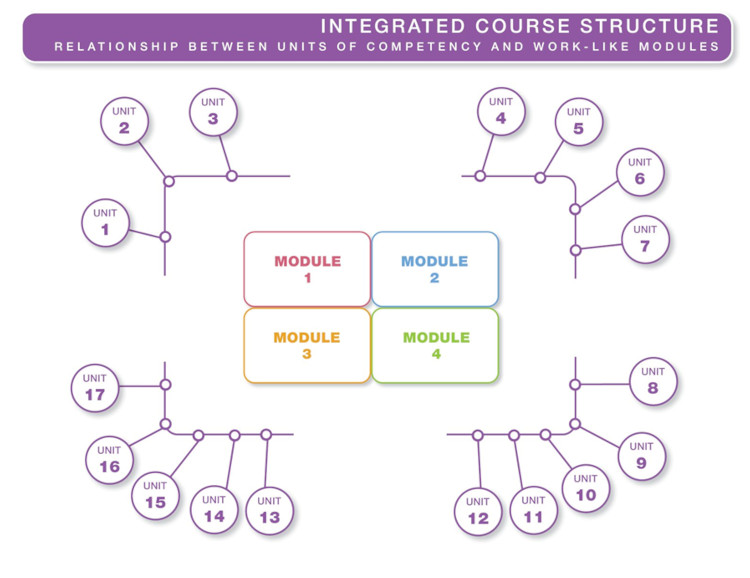
Childcare Courses in Australia: Your Complete Guide to a Rewarding Career
Studying a childcare course in Australia is the first step toward joining one of the country’s most impactful and in-demand professions. Early childhood educators play a critical role in shaping the emotional, social, and cognitive development of young children – from infancy through to school entry.
Whether known as early childhood educators, childcare workers, early learning professionals, or family day care providers, these roles share a common goal: to create safe, nurturing environments where children can grow, explore, and thrive.
If you're considering a career in early childhood education, understanding your training options and career pathway is essential. This guide provides a clear overview of everything you need to know about childcare courses in Australia.

What Does an Early Childhood Educator Do?
Childcare educators work across a wide range of settings, including:
- Long day care centres
- Kindergartens and preschools
- Family day care services
- Occasional and outside school hours care
Core responsibilities include:
- Planning and implementing play-based learning programs
- Supporting children's emotional and social development
- Monitoring developmental milestones
- Maintaining safe and inclusive learning environments
- Collaborating with families and colleagues
Which Childcare Course Is Right for You?
Australia's early childhood sector is built around nationally recognised qualifications:
- CHC30121 Certificate III in Early Childhood Education and Care – The entry-level qualification required to work as an assistant educator.
- CHC50125 Diploma of Early Childhood Education and Care – Prepares you for lead educator and management roles.
- Early Childhood Combo – A streamlined program combining both qualifications for faster progression and broader job prospects.
All courses include mandatory work placements, giving students practical, hands-on experience in real early learning settings.
Why Choose ITAC for Your Childcare Course?
ITAC’s nationally available childcare courses in Australia are built for flexibility, speed, and job-readiness. Our integrated delivery model eliminates repetitive content and follows a logical, real-world structure – helping students complete their qualifications faster without compromising quality.
Key benefits include:
- 100% online, self-paced learning
- Integrated course structure (not unit-by-unit)
- Placement support included
- National recognition across all Australian states and territories
- Focused trainer support tailored to adult learners
Career Prospects and Industry Outlook
The Australian early childhood sector continues to experience strong growth, driven by:
- Population increases
- Greater government investment in early learning
- Rising demand for qualified educators across metro and regional areas
Career opportunities include:
- Assistant educator
- Lead educator or room leader
- Centre director or educational leader
- Family day care coordinator
- Early years support roles in community and not-for-profit settings
Work conditions often include family-friendly hours, job stability, and access to ongoing professional development.
Begin Your Career with a Childcare Course in Australia
If you’re ready to enter a profession that offers purpose, flexibility, and long-term security, enrolling in a childcare course in Australia is your next step. Whether you’re passionate about supporting babies, engaging toddlers, or preparing preschoolers for their next stage, ITAC’s nationally recognised qualifications will prepare you to succeed.
Navigating This Guide
This guide covers everything you need to know about studying childcare courses in Australia.
Quick Links - If you don't need the full article:
- CHC30121 Certificate III in Early Childhood Education and Care
- CHC50125 Diploma of Early Childhood Education and Care
- Early Childhood Education and Care Combo
Key Resources:
Contact Us:
- Phone: 1300 858 191
- Email: info@itac.edu.au
- Contact Page
Below you'll find links to an in-depth exploration of each topic – simply select the area you'd like to learn more about:
Table of Contents
- CHC30121 Certificate III in Early Childhood Education and Care
- CHC50125 Diploma of Early Childhood Education and Care
- Early Childhood Education and Care Combo (Certificate III & Diploma)
- Choosing the Right Childcare Course in Australia
- ITAC’s Integrated Childcare Course Model: A Better Way to Study
- How You'll Study: Online Child Care Course Delivery with Support and Flexibility
- Work Placement for Child Care Courses: Real Experience That Builds Your Career
- Working in a Long Day Care (LDC) Centre
- Working in a Family Day Care (FDC) Service
- Working in a Kindergarten Setting
- Support for Students Studying a Child Care Course with ITAC
- Study Tips for Adult Learners Completing a Child Care Course
- How Much Do Childcare Educators Get Paid in Australia?
- Case Study 1 – Arashdeep, Certificate III Student (VIC)
- Case Study 2 – Thanh, Diploma Student (NSW)
- Case Study 3 – Ashleigh, Combo Student (WA)
- Frequently Asked Questions (FAQs) About Studying a Child Care Course
- Key Takeaways: What You Need to Know About Studying a Child Care Course
- Your Next Step Starts Here
CHC30121 Certificate III in Early Childhood Education and Care

If you're considering a career in early childhood education, enrolling in a childcare course is your ideal first step. The CHC30121 Certificate III in Early Childhood Education and Care is the foundational qualification required to begin your career working with young children. This nationally recognised qualification provides essential skills and knowledge to succeed in various early childhood settings, including childcare centres, kindergartens, and family day care.
Why Choose the Certificate III Child Care Course?
A Certificate III childcare course provides practical skills specifically designed for entry-level roles. Throughout your study, you will learn how to support children's development, ensure their health and safety, create engaging play-based learning environments, and build strong relationships with families.
Here’s what you can expect to learn:
- Supporting children's health, hygiene, and overall wellbeing in daily routines.
- Developing inclusive learning environments to nurture each child's unique potential.
- Guiding children’s behaviour using respectful, child-focused strategies.
- Documenting children’s learning and developmental milestones effectively.
- Building and maintaining positive relationships with children and their families.
- Adhering to ethical, legal, and professional standards in childcare settings.
Practical Experience in a Real Child Care Environment
A key feature of this childcare course is the mandatory 160-hour practical placement. You will work directly with babies, toddlers, and preschool-aged children, applying your theoretical knowledge in real-world settings under expert supervision. During placement, you will:
- Participate in daily routines such as meal times, naps, and educational activities.
- Plan and set up engaging learning experiences aligned with Australia’s Early Years Learning Framework (EYLF).
- Observe and document children's progress, learning how to respond effectively to their developmental needs.
Faster Completion and Career Readiness
At ITAC, our Certificate III childcare course uses an innovative integrated structure, enabling you to finish your studies in just 6 months - allowing you to start your childcare career and begin earning sooner. Traditional courses typically take 12–18 months.
Choosing ITAC’s streamlined delivery model means:
- Less repetition: Consolidated topics reduce unnecessary duplication.
- Fewer assessments: Complete relevant, workplace-oriented tasks.
- Faster outcomes: Become job-ready significantly quicker than traditional courses.
Trainer Support
ITAC offers extensive support throughout your studies, ensuring you’re fully prepared to succeed. Our experienced, locally based trainers provide:
- Regular, personalised guidance via phone, email, and live webinars.
- On-site visits during placement for hands-on support and feedback.
- Assistance in documentation and preparation for employment in childcare settings.
Completing the CHC30121 Certificate III in Early Childhood Education and Care positions you as a highly employable professional in a sector known for its stability, community value, and career growth opportunities. Whether you’re starting a new career or formalising your existing experience, this childcare course is your pathway to making a meaningful difference in the lives of young children and their families.
CHC50125 Diploma of Early Childhood Education and Care

The CHC50125 Diploma of Early Childhood Education and Care is your next step for advancing your career in early childhood education. This nationally recognised qualification prepares you for senior educator roles and leadership positions within childcare centres, kindergartens, preschools, and family day care settings. It equips you with the skills to confidently manage teams, oversee educational programs, and effectively liaise with families and community stakeholders.
Why Choose the Diploma Child Care Course?
A Diploma childcare course provides the skills and knowledge necessary for roles involving greater responsibility. During your studies, you will learn how to lead educational programs, manage regulatory compliance, mentor staff, and build effective partnerships with families and communities. These skills are critical for ensuring high-quality care and educational outcomes for children.
You can expect to learn about:
- Designing and implementing curriculum aligned with approved learning frameworks.
- Managing compliance with national regulations and quality standards.
- Promoting inclusive and culturally respectful practices.
- Guiding and mentoring teams of educators effectively.
- Partnering closely with families to enhance children's learning experiences.
- Integrating sustainable practices into daily operations and learning activities.
- Utilising data and observations to continuously improve educational programs and practices.
Practical Experience in a Leadership Role
The Diploma includes a compulsory 280-hour practical placement, providing real-world leadership experience with babies, toddlers, and preschool-aged children. During placement, you will take on leadership tasks, gaining valuable experience in supervisory and managerial roles, including:
- Overseeing daily operations and routines, ensuring adherence to regulatory standards and best practices.
- Planning, implementing, and evaluating educational programs using the Early Years Learning Framework (EYLF).
- Providing leadership and mentorship to fellow educators, enhancing team performance, and promoting professional growth.
Faster Completion and Career Progression
At ITAC, the Diploma childcare course utilises an integrated learning structure, allowing you to complete your qualification in just 6 months. Compared to traditional programs lasting 12–18 months, you can enter senior roles and progress your career faster. This accelerated path means you can quickly move into positions with increased responsibility and higher earning potential.
Choosing ITAC’s structured approach means:
- Reduced duplication: Integrated modules streamline your studies.
- Workplace-relevant assessments: Practical tasks closely align with industry demands.
- Accelerated entry into leadership roles: Gain essential competencies sooner and start making an impact in your workplace immediately.
Trainer Support
ITAC’s experienced trainers provide ongoing support tailored to your educational goals and career ambitions. Throughout your studies, you benefit from personalised assistance and structured learning support, including:
- Regular guidance and feedback via phone, email, and live webinars.
- In-person support during practical placements to ensure your skills align with industry expectations.
- Career preparation assistance including job readiness training, professional documentation support, and tailored advice for entering senior roles.
Completing the CHC50125 Diploma of Early Childhood Education and Care sets you apart as a skilled leader within the early childhood education sector. Whether you’re aiming for a managerial role or seeking to deepen your expertise, this diploma course equips you with the essential capabilities to thrive and positively impact the lives of children and families.
Early Childhood Education and Care Combo (Certificate III & Diploma)

The Early Childhood Education and Care Combo offers you an efficient pathway to complete both the CHC30121 Certificate III and CHC50125 Diploma qualifications simultaneously. This streamlined dual qualification is designed for students seeking to rapidly progress their career in early childhood education from entry-level roles to leadership positions.
Why Choose the Combo Child Care Course?
The Combo course provides comprehensive coverage of both foundational and leadership skills. It enables you to smoothly transition from supporting roles into positions involving more responsibility, without the typical delays of enrolling in separate courses. This integrated approach ensures you are fully equipped for various roles within childcare environments.
Throughout the Combo course, you will learn:
- Fundamental childcare skills including health, safety, play-based learning, and relationship-building with families.
- Leadership and management competencies such as curriculum planning, team guidance, regulatory compliance, and operational management.
- Strategies for effective communication, documentation, and continuous improvement in childcare practices.
Practical Experience Across Both Levels
The Combo course includes a combined 440-hour practical placement, split between Certificate III (160 hours) and Diploma (280 hours) placements. During these placements, you will gain hands-on experience across a spectrum of early childhood education responsibilities, from daily care routines to managing educational programs and teams.
You will:
- Engage directly in child-focused routines and activities, applying foundational knowledge and practical skills.
- Undertake responsibilities involving curriculum design, compliance management, and team leadership, gaining experience necessary for senior roles.
- Receive consistent guidance and mentoring from experienced childcare professionals throughout your placement.
Accelerated Pathway and Early Career Start
Choosing ITAC’s Combo course allows you to complete both qualifications in just 9 months, significantly quicker than traditional methods. This rapid pathway means you can quickly secure employment and advance into higher-paying, responsible roles within the early childhood education sector.
Benefits of ITAC’s Combo course include:
- Reduced repetition and efficient learning through integrated course delivery.
- Practical, industry-focused assessments relevant to current childcare practices.
- Faster career progression from foundational roles to leadership positions.
Trainer Support
ITAC ensures continuous, tailored support to guide you throughout the Combo course, providing you with:
- Frequent, personalised interactions via webinars, phone, and email.
- Comprehensive support during placements, including site visits.
- Career-oriented advice and assistance to smoothly transition from study into employment.
The Early Childhood Education and Care Combo positions you effectively for a successful, fulfilling career across multiple childcare roles. It provides the essential skills and experiences to confidently contribute to and lead within the early childhood education field.
Choosing the Right Childcare Course in Australia
When you're considering a career in childcare in Australia, selecting the right course can be confusing. There are different qualifications like the Certificate III, Diploma, and Combo courses available, each designed for specific roles and career goals. It's important to understand these options clearly so you can choose the one that best fits your needs and ambitions.
If you're new to the childcare sector, you'll usually start with the Certificate III in Early Childhood Education and Care. This course gives you essential skills to work confidently in entry-level roles. Once you've earned your Certificate III, you can progress to the Diploma, which opens doors to leadership and management positions.
At ITAC, we offer a special Combo childcare course. This unique course combines the Certificate III and Diploma into one streamlined program. It saves you time and helps you move smoothly from foundational skills to leadership roles, all while complying fully with Australian childcare qualification rules.
Why Choose the Combo Childcare Course?
The Combo course is a popular choice for students who want to fast-track their career without compromising on quality. It’s designed to make studying simpler and more effective. Here’s what makes it a smart choice:
- Complete faster: Finish both qualifications quicker than studying them separately.
- Less repetition: The combined approach reduces overlap, saving you time.
- Fewer assessments: Less paperwork and fewer assessments mean more time learning practical skills.
- Start earning sooner: Move quickly into higher-paying childcare roles.
- Flexible learning: Apply your new skills directly in real-world childcare settings.
- Career boost: Improve your employability with qualifications highly valued by childcare employers.
By choosing the Combo course, you’ll gain comprehensive skills and confidence, enabling you to start your childcare career quickly and effectively.
Certificate III or Diploma: Which is Right for You?
- Certificate III: Best suited if you're just starting your childcare career. You'll learn essential childcare skills such as creating safe environments, supporting children's learning, and working closely with families.
- Diploma: Ideal for those who already have their Certificate III and are ready for more responsibilities, including managing teams and developing educational programs.
How to Decide on Your Childcare Course
Think about your current situation and where you want your childcare career to take you:
- Are you new to childcare? The Certificate III is your entry point.
- Have you completed Certificate III and want to progress further? Consider the Diploma.
- Want the fastest route to a higher role? The Combo course offers the most efficient pathway.
Choosing the right course sets the foundation for a successful childcare career, so it’s worth taking the time to consider your options carefully.
Get Started with ITAC Today
Enrolling in ITAC’s childcare courses means you’ll receive quality education and strong support from experienced local trainers. Our courses are specifically designed to fit around your lifestyle, providing flexibility and comprehensive support to help you succeed.
Take the first step towards your rewarding career in childcare today – choose ITAC and start building a bright future for yourself and the children you'll support.
ITAC’s Integrated Childcare Course Model: A Better Way to Study
Many traditional childcare courses separate their content into individual units, each with its own assessments. While this method might seem organised, it often results in unnecessary repetition and longer study times. At ITAC, we’ve developed a unique integrated learning model that brings related skills and knowledge together into practical, workplace-focused modules. This method helps you learn more effectively and efficiently, preparing you better for real childcare jobs.

Key Advantages of ITAC’s Integrated Childcare Course
Our integrated childcare course approach offers distinct advantages over traditional methods, ensuring you have the best possible learning experience:
- Quicker Completion: ITAC students commonly complete their qualifications in about half the time of traditional courses – usually within 6-9 months rather than 12-18 months. This quicker completion means you can start your career sooner and benefit financially earlier.
- More Relevant Learning: By integrating related skills and knowledge into practical scenarios, the learning experience mirrors real-life childcare tasks. This means you'll gain confidence in your abilities from day one, feeling well-prepared for your future workplace.
- Reduced Repetition: Traditional childcare courses often require students to repeatedly cover the same topics, such as confidentiality, safety, or communication, across different units. Our integrated course model consolidates these overlapping skills into fewer assessments, helping you learn without unnecessary redundancy.
- Clear and Structured Content: Our modules are designed to clearly reflect real-world childcare roles and responsibilities, making your study sessions more relevant and engaging. This structured approach helps you stay motivated and focused throughout your course.
- Strong Outcomes and Higher Success Rates: ITAC students consistently achieve higher success rates and better retention of knowledge due to our practical, hands-on learning methods. Our integrated model ensures you retain what you learn because it’s directly applied to tasks you'll encounter in childcare jobs.

A Practical Example: Streamlining Essential Skills
To illustrate the benefits of our integrated model, consider the essential skill of confidentiality, which traditional courses frequently cover repeatedly across multiple units. At ITAC, rather than assessing confidentiality multiple times separately, we integrate this skill comprehensively within practical, real-world scenarios. You’ll learn and demonstrate your understanding in ways that directly reflect workplace requirements, reducing redundancy and making your studies more meaningful.
This method applies not only to confidentiality but to many other critical areas including:
- Workplace health and safety
- Effective communication with families and colleagues
- Cultural awareness and inclusive practice
- Following policies, procedures, and ethical guidelines
- Maintaining professional boundaries and responsibilities
Why ITAC Students Recommend the Integrated Childcare Course
Our students regularly share positive feedback about the integrated course structure. They find it easier to manage their study loads due to fewer repetitive assessments and clearer, more relevant course content. Many students appreciate being able to see immediate connections between their studies and real childcare tasks. This helps them maintain motivation and clearly understand the practical importance of their training.
The Long-term Benefits of ITAC’s Integrated Model
Besides the immediate advantages, the long-term benefits of ITAC’s integrated childcare course model are significant. Completing your qualifications faster means you can enter the workforce sooner, begin earning a stable income earlier, and start advancing your career quicker. Graduates also often report higher confidence levels, knowing they have received highly relevant, practical training designed specifically around the realities of childcare workplaces.
Start Your Childcare Career with ITAC Today
Choosing ITAC means choosing a childcare course designed to meet the real needs of modern childcare professionals. With dedicated trainer support, flexible learning options, and our uniquely efficient integrated course model, your childcare career starts here.
Ready to take the next step? Join thousands of successful graduates who have advanced their careers with ITAC’s childcare courses. Enrol today and see how our integrated approach can help you build the childcare career you’ve always wanted.
How You'll Study: Online Child Care Course Delivery with Support and Flexibility

At ITAC, every child care course is delivered online in a structured and supported format. This mode is ideal for adult learners across Australia who need flexibility without sacrificing quality, compliance, or support. Whether you're managing work, parenting, or other commitments, ITAC's online child care courses are designed to fit your lifestyle – without compromising outcomes.
If you're new to the sector, or even to Australia, this is the easiest and most efficient way to begin. Our courses are nationally recognised, job-focused, and backed by experienced local trainers who understand the real-world demands of the early childhood profession.
Why Choose an Online Child Care Course?
Our online child care course model is built specifically for adult learners. It’s flexible, simple to follow, and highly effective. You can study at your own pace, access resources anytime, and get support from your trainer whenever needed. Key features include:
- Self-paced and flexible – study mornings, evenings, weekends – whatever suits your schedule.
- Clear, structured content – no confusion, no unit-by-unit repetition. Just one logical, easy-to-follow learning path.
- 24/7 access to course materials – including interactive modules, reading content, and audiobook versions.
- Regular trainer contact – phone, email, and live webinar support.
- Optional virtual check-ins – stay on track and ask questions during scheduled catch-ups.
- National access – study from anywhere in Australia.
Trainer Support Throughout Your Online Child Care Course
Online learning at ITAC is designed to keep you supported every step of the way. Our experienced team of trainers is available to assist with key parts of your child care course – from getting started, to preparing for placement, to completing assessments. Support is delivered via phone, email, live webinars, and optional virtual check-ins, making it easy to get help when you need it.
Our trainers are qualified early childhood professionals who understand the needs of adult learners balancing study with work, parenting, and other commitments. You can expect clear, practical guidance throughout your course, including:
- Interpreting and completing assessments
- Preparing for placement
- Reviewing work and providing actionable feedback
- Managing your study progress if challenges arise
With structured support and flexible access to experienced trainers, you'll never feel like you're studying alone.
Work Placement: Essential for All Child Care Courses
Every child care course includes a mandatory work placement in an approved early learning service. This is where you apply your skills and knowledge in a real-world setting under the guidance of experienced professionals.
During placement, you’ll:
- Work directly with babies, toddlers, and preschool-aged children
- Participate in routines, learning experiences, and documentation
- Apply course content such as safety procedures, child development, and communication strategies
- Receive observation and support from ITAC trainers
This is a critical part of all nationally recognised child care courses and ensures you're confident and job-ready by the time you graduate.
Built for Busy Adults – Not School Leavers
Our course content is written in clear, straightforward English. You won’t be overwhelmed with academic theory or long-winded readings. Everything is practical, workplace-focused, and built around what educators actually do each day in child care settings.
Features include:
- No fluff or filler content
- Real-world tasks linked to job skills
- Highly visual, mobile-friendly modules
- Audio versions available for on-the-go learning
What Sets ITAC Apart
- All child care courses delivered 100% online with practical placement
- Logical integrated structure – no unit repetition
- Faster progression due to streamlined design
- Designed for adults: parents, career changers, and returning workers
- Built-in placement and trainer support from start to finish
Get Started Today
You can enrol in your online child care course at any time. Study at your pace, with real support, and graduate ready for work. No waiting periods. No unnecessary delays. Just a clear, efficient, and supported path to a career in early childhood education.
Work Placement for Child Care Courses: Real Experience That Builds Your Career
Every nationally recognised child care course in Australia includes mandatory work placement. Whether you're studying the CHC30121 Certificate III in Early Childhood Education and Care or the CHC50125 Diploma of Early Childhood Education and Care, placement is where theory becomes skill, and knowledge becomes confidence. At ITAC, your placement is a structured, supported opportunity to gain real-world experience and prepare for your new career.
Placement Hours and Course Requirements
- CHC30121 Certificate III: 160 hours
- CHC50125 Diploma: 280 hours
- CHC30121 + CHC50125 Combo: 440 hours total (160 + 280)
Hours are completed in a regulated children’s service such as a long day care centre. Placement typically occurs across 2–4 days per week depending on your availability.
Key Activities During Placement
During your time in a service, you will engage in real tasks that reflect the role of an educator:
- Assisting with routines such as meals, sleep, and hygiene
- Facilitating and supervising play-based learning
- Engaging with children across all age groups (0–6 years)
- Observing children and recording developmental milestones
- Preparing activities and materials
- Participating in staff communication and team discussions
- Applying policies around safety, wellbeing, and inclusion
- Gathering evidence for assessment through a professional portfolio
Approved Services and Supervisors
Your placement must take place in a regulated service approved by ACECQA. You must also be supervised by a qualified educator with a diploma or higher qualification in early childhood. For the Certificate III, you must work directly with at least:
- Two babies under 12 months
- Two toddlers aged 13–23 months
- Two children aged 2–6 years
Diploma students must complete their first 160 hours in a long day care or family day care service before continuing to other approved settings such as kindergartens or OSHC.
Evidence and Assessment Requirements
To verify your placement, you will complete:
- A timesheet signed by your supervisor
- A professional practice portfolio including activity planning, reflections, and documentation samples
- Practical demonstrations assessed during a site visit by your ITAC trainer
- A workplace scenario task and a supervisor report
These tasks confirm that you’ve applied your learning in practice and can perform to industry standards.
Paid Work as Placement
If you’re currently employed in an approved child care service, your paid hours can count toward placement. This is allowed provided:
- The work aligns with the qualification’s learning outcomes
- Your role includes typical educator tasks
- You have a qualified supervisor
- Your employer allows for trainer visits and assessment activities
This is a common option for many students and can significantly reduce the time needed to arrange additional placement.
Placement Support from ITAC
ITAC provides full support before, during, and after placement. This includes:
- Templates and guides for preparing and recording your placement
- Access to an experienced trainer for questions or concerns
- A site visit to assess your skills and provide feedback
- Assistance with troubleshooting issues or finding a service (if needed)
Employment Opportunities After Placement
Many students receive job offers during or shortly after their placement. Services value students who show initiative, ask questions, and demonstrate a clear understanding of best-practice early childhood strategies. Even if you’re not offered a position directly, you’ll finish with a solid reference, real experience, and the confidence to apply for educator roles immediately.
Key Placement Takeaways
Work placement is a critical part of every child care course and is where you build the real-world skills needed to succeed in the sector. It’s not a formality or checkbox – it’s where you develop confidence, learn directly from experienced educators, and start thinking and working like a professional. Take it seriously and treat every shift like a job trial.
- Placement is compulsory for all students – no exceptions
- You must work directly with children across a range of age groups
- The service must be approved and registered with ACECQA
- A diploma-qualified educator must supervise and sign off your hours
This is where your career begins – not after the course, but during it. The habits, mindset, and professionalism you build on placement will shape how employers see you and how ready you are to step into paid work.
Working in a Long Day Care (LDC) Centre
If you’re new to Australia or exploring a career in early childhood education, one of the most important things to understand is where most graduates of child care courses actually end up working. In most cases, that place is a Long Day Care (LDC) centre. These are the well-known, centre-based services located throughout Australian suburbs, usually near schools, shops, and residential areas.
Long Day Care centres operate year-round and provide care for children from birth to school age. They are the largest employers in the early childhood sector and the most common setting for students completing a child care course. If you’ve driven past a purpose-built centre with a playground out front – it was almost certainly an LDC.

An LDC typically opens early in the morning (around 6:30–7:00am) and closes around 6:00pm, offering full-day sessions to suit working families. The centre is usually divided into rooms based on age: infants (0–2), toddlers (2–3), and preschoolers (3–5). Each room is staffed by a team of qualified educators who implement play-based learning programs, maintain safety and hygiene, and support each child’s development. All educators must hold or be actively working towards a nationally recognised qualification, usually gained through a child care course.
What Does a Typical Day Look Like in an LDC?
Working in a Long Day Care centre involves a balance of routines and learning activities. Your day might include:
- Greeting children and families at drop-off
- Supervising indoor and outdoor play
- Supporting rest and sleep routines
- Helping with hygiene, toileting, and nappy changes
- Preparing bottles, snacks, and meals
- Running learning experiences such as art, story time, and music
- Documenting observations and recording developmental milestones
- Speaking with families about their child’s day
Every LDC must follow an educational program based on the Early Years Learning Framework (EYLF), which guides educators to support learning through play, relationships, and intentional teaching.
Who Will You Work With?
Long Day Care services are team environments. Depending on your role and the size of the service, you may work alongside:
- Assistant educators (CHC30121 Certificate III in Early Childhood Education and Care)
- Lead educators or room leaders (CHC50125 Diploma of Early Childhood Education and Care)
- Educational leaders and centre directors
- Early Childhood teachers (degree qualified)
Teamwork is central to LDC operations. You’ll be expected to collaborate, attend team meetings, contribute to planning, and communicate with families and colleagues daily.
Why LDC Is the Main Pathway After a Child Care Course
The majority of child care course graduates begin their careers in Long Day Care. These services exist in nearly every suburb, employ the largest share of early childhood professionals, and offer the broadest range of job types – from part-time assistant roles to full-time leadership positions. Most practical placements also take place in LDCs, giving you direct exposure to the real working environment before you even finish your qualification.
If you’re aiming for long-term employment, steady hours, and career progression, working in a Long Day Care centre is the most common way to begin your journey in the early childhood sector.
Working in a Family Day Care (FDC) Service
While most graduates of a child care course will start in a Long Day Care centre, another important part of Australia’s early childhood sector is Family Day Care (FDC). This model offers a very different experience for both educators and families. If you're considering alternatives to centre-based work, or plan to run your own small service in the future, it’s worth understanding how Family Day Care works.

Family Day Care is a home-based education and care option provided by individual educators who are registered with an approved coordination unit. Each FDC educator runs their own service from their home, typically caring for up to four children under school age at a time (plus up to three school-aged children). This allows for small group sizes and a personalised, relationship-focused style of care.
FDC educators usually operate during standard working hours, but may offer flexible arrangements depending on family needs and the educator’s availability.
What Does a Day in Family Day Care Look Like?
FDC days are structured around play, routines, and learning opportunities just like in centre-based care. However, because the group size is small, the environment is more relaxed and less formal. A typical day might include:
- Free play with toys and sensory materials
- Story time or music sessions
- Shared meals prepared by the educator
- Outdoor play in a backyard or local park
- Arts and crafts
- Nap or rest time
- Excursions to the library, playgroup, or nature walks
All activities are guided by the Early Years Learning Framework (EYLF), and FDC educators are required to document learning, communicate with families, and meet the same national standards as any other early childhood service.
Who Works in Family Day Care?
Family Day Care educators are self-employed but must register through an approved FDC coordination service, which provides support, compliance checks, and training. Educators must:
- Hold an approved child care qualification, such as the CHC30121 Certificate III in Early Childhood Education and Care
- Hold a current first aid certificate
- Meet working with children check requirements
- Maintain a safe and approved home environment
Some educators go on to complete the CHC50125 Diploma of Early Childhood Education and Care, especially if they wish to take on more complex documentation, curriculum planning, or leadership roles within the FDC scheme.
Is Family Day Care Right After a Child Care Course?
Most graduates won’t go directly into Family Day Care unless they have previous experience and a suitable home environment. However, it’s a viable career path for those seeking flexibility, independence, and the ability to work from home. Many FDC educators are parents of young children who want to earn an income while caring for their own children at the same time.
Completing a child care course such as the CHC30121 Certificate III in Early Childhood Education and Care is the minimum requirement to get started, but you’ll also need strong initiative, planning skills, and the ability to manage your own service. For the right person, Family Day Care offers a rewarding, low-ratio environment that combines home life with meaningful professional work.
Working in a Kindergarten Setting
Kindergarten, or “kindy”, is a unique part of Australia’s early childhood education sector. It typically serves children in the year before they start formal schooling – around age 4 to 5 – and is designed to help them transition smoothly into a school environment. While many educators complete a childcare course with the goal of working in a Long Day Care centre, some prefer the shorter hours, smaller groups, and school-readiness focus of kindy.

Unlike Long Day Care or Family Day Care, kindergartens are not full-day care services. They often operate for a few set days each week, with shorter sessions (for example, 9:00am to 2:00pm). Children usually attend on the same days with the same group of peers, which helps build consistency, routine, and confidence.
What Does a Typical Kindy Day Involve?
A day in kindergarten follows a structured, play-based routine aimed at developing children’s social, emotional, and communication skills. While care tasks such as nappy changes and rest time are generally not part of the program, educators still play an active role in supervision, guidance, and learning support. A typical day might include:
- Free play indoors and outdoors
- Group experiences such as story time, music, or shared discussions
- Simple learning activities such as counting, puzzles, and drawing
- Snack or lunch break
- Clean-up routines and home time preparation
Because children are older and more independent, kindy routines are focused on helping them build confidence with group participation, self-regulation, and following instructions – key skills for starting school.
Who Runs Kindergarten Programs?
Kindergartens are often operated by community organisations, local councils, schools, or not-for-profits. Some are located within primary school grounds and may use classrooms attached to the main school. Others are stand-alone services located in community halls or early learning hubs. These services usually follow a school term calendar and close during school holidays.
Each group is led by a university-qualified early childhood teacher, supported by an educator or assistant. Educators who hold a qualification such as the CHC30121 Certificate III in Early Childhood Education and Care or the CHC50125 Diploma of Early Childhood Education and Care may be employed in support roles. These roles involve helping set up activities, supervising children, engaging in learning, and managing transitions throughout the day.
How Is Kindy Different from Other Child Care Services?
Kindy feels more like a “mini-school” than a childcare centre. There’s a stronger focus on preparing children for school, both socially and academically. Group sizes are smaller, usually around 20 children, and the environment is more predictable. Children learn to unpack their bags, sit for group time, follow structured routines, and participate in basic learning programs.
Unlike Long Day Care centres, kindergartens don’t offer flexible bookings, extended hours, or full-year operation. Parents usually drop off and collect their child at set times on set days. The consistency appeals to many families, and the smaller scale often creates strong relationships between staff, children, and families.
Can You Work in Kindy After a Child Care Course?
Yes – many students who complete a childcare course go on to work in kindy settings, particularly in assistant roles under the supervision of a teacher. These positions are ideal if you enjoy working with preschool-aged children, prefer shorter days, and are interested in early education more than daily care routines. Having a CHC30121 Certificate III in Early Childhood Education and Care or CHC50125 Diploma of Early Childhood Education and Care will prepare you for this type of role.
Just remember, kindergarten programs vary greatly between states and territories. In some areas, the term “kindy” means the year before school; in others, it refers to the first year of school itself. Requirements for staffing, hours, and curriculum also differ. Always check with your state or territory’s education department or school system if kindy is a setting you wish to pursue.
Support for Students Studying a Child Care Course with ITAC
Studying a child care course as a busy adult can be challenging, especially when juggling work, family, and other commitments. That’s why ITAC builds support into every part of your course – from enrolment to placement to graduation. Whether you're completing the CHC30121 Certificate III in Early Childhood Education and Care, the CHC50125 Diploma of Early Childhood Education and Care, or the Combo, you’ll have access to structured, reliable, and experienced support from real trainers who know the industry.
Trainer Contact and Ongoing Guidance
- Regular access to your trainer by phone, email, or online message. Most questions are answered within 1 business day, and longer issues can be resolved by scheduling a call.
- One-on-one help when you need it – whether you're stuck on an assessment, unsure about course content, or just need reassurance.
- Friendly, plain-English advice from real early childhood professionals, not just customer service staff or call centres.
Live Sessions and Online Support Tools
- Weekly optional live webinars where trainers go through key topics, demonstrate practical tasks, or answer common questions.
- Q&A sessions with other students for motivation, discussion, and clarification.
- Audio versions of key content to help busy students learn on the go – great for listening while doing housework, commuting, or on a lunch break.
Assessment Support and Feedback
- Clear, direct instructions for every task – no vague questions or confusing forms.
- Fast, detailed feedback on your submissions so you know exactly what’s working and what needs improvement.
- Support to improve writing skills or help structure responses if you’re unsure how to begin.
- Reminders and follow-ups if you’re falling behind – so small issues don’t become major ones.
Placement Support and Real-World Coaching
- Help finding a suitable placement if needed, including advice on what to say when calling or emailing centres.
- On-site trainer visits during placement to assess your progress and provide real-time, practical feedback.
- Guidance with placement documentation, portfolio tasks, and preparing for final assessments.
Ongoing Motivation and Progress Tracking
- Regular check-ins to see how you’re going and provide study tips based on your learning style.
- Progress reports to keep you on track and identify gaps early.
- Encouragement and realistic planning if you need to pause or take longer than expected.
At ITAC, student support isn’t an optional extra or a marketing feature – it’s part of the course design. Every child care course is built around the needs of adult learners, with clear structure and real help when you need it. Whether you're returning to study after years away or tackling a new career path with limited spare time, support is always available from trainers who care about your success.
Study Tips for Adult Learners Completing a Child Care Course
Studying a child care course as an adult can feel overwhelming – especially if it’s been years since you last studied. Many students at ITAC are juggling parenting, work, or changing careers, and are fitting study into already full days. The good news is that our courses are designed for adult learners, and with the right approach, you can succeed even if you haven’t opened a textbook since high school. Below are practical study strategies tailored to students completing the CHC30121 Certificate III in Early Childhood Education and Care, the CHC50125 Diploma of Early Childhood Education and Care, or the Combo course.
Set a Weekly Study Routine – Even If It's Flexible
- Allocate realistic times each week for study and stick to them as much as possible. You don’t need to study every day, but consistency matters more than intensity. For example, aim for two 90-minute blocks per week, rather than cramming all day once a fortnight.
- Use a planner, app, or even a wall calendar to block out study time. Treat it like an appointment – don’t cancel it for minor tasks.
Break Tasks into Manageable Chunks
- Avoid thinking of assessments as one giant task. Break them into smaller parts: read the instructions, plan your answers, write one section at a time, then edit.
- Most assessment tasks in a child care course can be completed in short bursts. You don’t need hours of uninterrupted time – just focus and structure.
Use ITAC’s Support Resources
- Reach out to your trainer if you're stuck. A 10-minute call can save hours of frustration.
- Join the optional webinars and Q&A sessions. Hearing others ask questions often helps clarify things you didn’t even know you were confused about.
- Use the audio recordings to study while driving, doing chores, or walking. Many students say this is their most productive study time.
Create a Study-Friendly Environment
- You don’t need a private study room – just a reliable space where you can focus. Turn off distractions, clear the table, and set a timer.
- Let your family know when you’re studying. Put up a note or use headphones as a signal that you’re “off duty” for a little while.
Build Confidence with Small Wins
- Don’t aim for perfection. Aim to submit something. Feedback will help you improve, but you can’t get feedback on a blank page.
- Celebrate completing each topic or task, even if it wasn’t perfect. Progress builds momentum.
Don’t Be Afraid to Ask for Help
- Many students wrongly believe they have to figure it all out alone. That’s not how our child care courses are designed.
- If English isn’t your first language or you struggle with writing, let your trainer know. They’ll help you unpack what’s being asked and how to respond.
Use Placement as a Learning Opportunity, Not Just a Requirement
- Ask questions while on placement. You’ll learn faster by watching, trying, and reflecting – not just by reading theory.
- Use your real-life observations and experiences to help you answer questions and complete tasks. It’s not about “school answers” – it’s about practical understanding.
Keep the Bigger Picture in Mind
- Remember why you enrolled. Whether it’s a career change, financial stability, or working with children – remind yourself regularly.
- Motivation naturally dips from time to time. That’s normal. What matters is pushing through small setbacks without giving up.
Completing a child care course is an investment in your future. With flexible, adult-friendly study options and structured support, ITAC makes it possible to study at your own pace while still progressing towards a nationally recognised qualification. Build habits, ask for help, and stay focused – you’ll be surprised how far you can go.
How Much Do Childcare Educators Get Paid in Australia?
One of the most common questions from students enrolling in a child care course is, “How much do childcare educators actually get paid?” While there’s no single answer, there are clear patterns based on job role, qualification level, experience, and employer. Whether you’re aiming for an assistant role after completing a CHC30121 Certificate III in Early Childhood Education and Care, or a leadership position with a CHC50125 Diploma of Early Childhood Education and Care, it’s helpful to understand how wages are determined across the sector.
The minimum wages for childcare educators in Australia are set by the Children’s Services Award, which outlines the base hourly and weekly rates for different roles. As of the 2024/2025 financial year, most qualified educators earn between the high $20s and low $40s per hour under the Award. These rates vary depending on whether you are Certificate III or Diploma qualified, and whether you're employed as an assistant, room leader, coordinator, or centre director. It's important to note that the Award provides the legal minimum, and many employers pay well above these base rates.

Entry-level positions typically start at around $27 per hour, increasing to as much as $90,000 per year for specialist roles such as service directors. Our analysis of hundreds of job advertisements across Australia found that advertised salaries were generally consistent with the Children’s Services Award, particularly at the Certificate III level. At the upper end, salaries were often above award rates to attract experienced staff capable of managing larger, more complex services. Many employers also offered additional benefits such as heavily discounted childcare fees, job stability, paid professional development, and flexible working arrangements.
Here’s how pay typically scales by role and qualification, according to our analysis:
- Assistant Educators (Certificate III qualified): These are the most common entry-level positions. Wages usually start at the base Award level, with many jobs offering $28–$32 per hour depending on the service and location. Some employers offer slightly higher rates to attract experienced or bilingual educators, especially in regional areas.
- Lead Educators or Room Leaders (Diploma qualified): Educators in these roles usually manage the daily operation of a room and supervise assistant staff. These positions are usually advertised between $32 and $38 per hour, with some exceeding that depending on responsibilities and location.
- Assistant Directors or Coordinators: These roles are less common but involve significant organisational and administrative responsibilities. Pay typically ranges from the high $30s to low $40s per hour and may include additional benefits or management allowances.
- Centre Directors: These are the most senior roles in centre-based early childhood services. While the Award sets a minimum wage for directors, many job ads list salaries from $75,000 to $95,000 per year, depending on the size of the centre, staffing levels, and business model.
Job location also plays a role in educator pay. Centres in high-demand metro areas or remote communities may offer above-award wages to attract qualified staff. Likewise, large providers with multiple centres often advertise higher salaries to stay competitive.
Workload and job structure also affect pay. Full-time roles may include responsibilities outside of direct contact hours, such as documentation, team meetings, and compliance. Casual roles offer higher hourly rates but come without the stability or benefits of permanent employment.
Experience also plays a role in pay progression. The Children’s Services Award includes automatic pay increases after 12 and 24 months of service in the same role. Many services also provide annual reviews, and some offer performance-linked bonuses or loyalty-based pay increases.
While some employers stick closely to Award rates, others use above-award wages as part of their attraction and retention strategy. Our review of current job advertisements shows that highly experienced Diploma-qualified educators, particularly those working in leadership roles, can command significantly higher rates than the Award minimum.
Ultimately, completing a nationally recognised child care course is the first step to accessing these opportunities. Whether you’re just starting with the CHC30121 Certificate III or progressing to the CHC50125 Diploma, your qualification plays a direct role in the types of roles – and pay rates – you’ll be eligible for.
Case Study 1 – Arashdeep, Certificate III Student (VIC)
After several years working as a chef and barista in Melbourne, Arashdeep decided it was time for a career change. While she enjoyed the energy and creativity of hospitality, she had always dreamed of becoming an educator. With a strong work ethic and experience in fast-paced environments, she knew she could bring valuable skills into early childhood education – especially around communication, patience, and multitasking.
Arashdeep enrolled in the CHC30121 Certificate III in Early Childhood Education and Care with ITAC to begin her transition. She chose the child care course because of its flexible, self-paced structure, which allowed her to keep working part-time while studying. Placement gave her hands-on experience and confirmed she was on the right path. Her goal is to start working as an assistant educator in a Long Day Care centre and build confidence in the classroom before eventually progressing to further study.
“I’ve worked in high-pressure kitchens and cafés for years, but this is the first time I’ve felt like I’m really building something for my future. I want to be part of a child’s learning journey – not just serve food and move on.”

Case Study 2 – Thanh, Diploma Student (NSW)
Thanh is a mother of four from western Sydney who spent over a decade raising her children full time. As her youngest started school, she began looking into career options that aligned with her strengths – nurturing, structure, and child development. With no recent formal work experience, Thanh wanted a course that respected her existing knowledge while helping her build new, industry-recognised skills.
She enrolled in the CHC50125 Diploma of Early Childhood Education and Care with the goal of gaining employment in a leadership role within a few years. She chose this child care course specifically because it focused on higher-level responsibilities such as programming, compliance, and staff supervision. Her long-term ambition is to eventually open her own child care service or become a service coordinator.
“This course is giving me the confidence to take myself seriously as a professional. I know what it means to care for children, but now I’m learning how to lead, document, and grow within the sector.”
Case Study 3 – Ashleigh, Combo Student (WA)
Ashleigh lives in regional WA and has worked in education for several years, both as an Education Support Worker and as a manager in an OSHC (Outside School Hours Care) program. She’s always been passionate about early learning, but realised that gaining formal qualifications was the key to building a sustainable, long-term career in the sector.
Ashleigh chose the Early Childhood Education and Care Combo course because she wanted to complete both the CHC30121 Certificate III and CHC50125 Diploma without delay. She selected the child care course based on its integrated design and the opportunity to fast-track her studies while continuing to work. She is particularly interested in roles that combine creativity with leadership – like programming coordinator or learning support within a childcare centre.
“Working with children is what I love, and I wanted a clear path that recognised my current experience but also challenged me. The combo gave me structure and flexibility – and it’s setting me up for a future in early childhood education that I’m genuinely excited about.”
Frequently Asked Questions (FAQs) About Studying a Child Care Course
If you're thinking about enrolling in a child care course, you probably have a few questions. From course requirements and placement to job outcomes and study expectations, this section answers the most common queries from prospective students.
1. How long does a child care course take to complete?
Most students complete the CHC30121 Certificate III in Early Childhood Education and Care in 6 to 9 months. The CHC50125 Diploma of Early Childhood Education and Care usually takes another 6–9 months if done separately. However, many students choose the Combo course to complete both qualifications together in 9–12 months. Your exact timeline depends on how many hours you can study each week. Courses are self-paced, so you can speed up or slow down based on your lifestyle and commitments.
2. What kind of jobs can I get after finishing a child care course?
Graduates of child care courses can work in a range of early childhood education roles, including:
- Assistant educator in a Long Day Care centre
- Educator in a Family Day Care service
- Kindergarten assistant
- Inclusion support educator
- Lead educator (Diploma only)
- Educational leader or room leader (Diploma only)
The CHC30121 Certificate III prepares you for entry-level positions, while the CHC50125 Diploma qualifies you for leadership roles. Many students receive job offers during or soon after completing placement.
3. Can I use paid work as my placement hours?
Yes, if you’re already working in a regulated child care service, your paid hours can often count towards your placement requirements. The key conditions are that your job role must align with course requirements, a qualified supervisor must be on-site, and you must have opportunities to complete all assessment tasks. Many students use their existing roles to complete placement hours, especially if they are already employed as educators or assistants. ITAC will confirm your eligibility before you begin.
4. Do I need to find my own work placement?
ITAC can assist with arranging your work placement if needed, but we find the best approach is for students to speak directly with their preferred child care service. Visiting in person, or reaching out through friends, family, or community networks, is often the most effective way to secure a placement. Many services appreciate the initiative and may even offer paid work during or after the placement. While we’re here to support you if you get stuck, this proactive, relationship-based method tends to produce the best outcomes.
5. Can I study a child care course while working or raising children?
Yes – most students completing a child care course through ITAC are balancing work, parenting, or both. The course is designed to be flexible, self-paced, and adult-friendly. You can study at any time of day, with no mandatory login times or fixed deadlines. Many parents study during school hours, evenings, or weekends. With access to trainer support, audio resources, and practical tools, you’ll be able to make steady progress even with a busy schedule. You can also pause or slow down if needed.
6. What support will I get while studying a child care course?
ITAC provides structured support from enrolment to graduation. You’ll have access to experienced early childhood trainers via phone, email, and webinars. Trainers are available to explain assessment tasks, answer questions, and give detailed feedback. We also support you during placement with a site visit and ongoing guidance. Students can access:
- Weekly optional live Q&A sessions
- Personalised assessment feedback
- Audio learning resources
- Placement preparation help
- Progress check-ins
Support is built into our childcare courses, so you’re never left on your own.
7. What qualification will I receive and is it recognised?
When you complete your child care course, you will receive a nationally recognised qualification issued by ITAC. Depending on your enrolment, this will be either the CHC30121 Certificate III in Early Childhood Education and Care, the CHC50125 Diploma of Early Childhood Education and Care, or both through the Early Childhood Combo course. These qualifications are part of the Australian Qualifications Framework (AQF) and are recognised in every state and territory. They are the minimum legal requirements to work in most early childhood education settings across Australia.
8. What’s the difference between the Certificate III, Diploma, and Combo?
The CHC30121 Certificate III is the entry-level qualification that allows you to work as an assistant educator. The CHC50125 Diploma qualifies you for leadership roles such as room leader, educational leader, or coordinator. The Combo course combines both qualifications into one streamlined program, reducing duplication and saving time. You’ll complete 440 hours of placement (160 for Certificate III and 280 for Diploma) and graduate with two nationally recognised qualifications. The Combo is ideal for students who want the full childcare career pathway in a single enrolment.
9. Are ITAC’s child care courses hard?
There are three nationally recognised courses: the CHC30121 Certificate III, the CHC50125 Diploma, and the Combo which includes both. For most students, the content is not hard – it's practical and based on common sense. You’ll learn how to keep children safe, support their learning, and follow daily routines. At Diploma level, you’ll cover more advanced topics like team supervision, documentation, leadership, and resolving conflicts in the workplace.
The main challenge isn’t the content itself – it’s staying motivated and consistent while studying online at your own pace. Students with limited English may need extra support, but we assess this during your enrolment interview and can advise you before you begin. Child care is not a highly technical field – it’s about being practical, reliable, and committed. Most students succeed with a bit of planning and support.
10. Will I get a job after completing a child care course?
While no course can guarantee employment, demand for qualified early childhood educators remains high across Australia. Completing a nationally recognised qualification significantly increases your chances of getting a job – especially if you show reliability, initiative, and professionalism during your placement. Many students are offered roles by their placement service, especially those enrolled in a course with a well regarded provider.
11. Do I need to buy textbooks or extra materials?
No, you won’t need to purchase textbooks. All learning materials are provided online as part of your childcare course. These include written content, audio versions, assessment tools, templates, and practical examples. You’ll be able to access your resources anytime via your student portal. You may choose to print some documents or take notes, but nothing additional is required to complete the course. Everything you need to succeed in your child care course is included – no hidden costs or unexpected extras.
12. What is the placement like in a child care course?
Placement is a compulsory part of all nationally recognised child care courses and is where you apply your learning in a real-world setting. You’ll work in a regulated early childhood service under the supervision of a qualified educator. Tasks include helping with routines, supporting play-based learning, interacting with children and families, and observing developmental milestones. For Certificate III, 160 hours are required; for Diploma, it’s 280 hours; Combo students complete both. Most students say placement is the most rewarding part of the course – it’s where theory becomes real, confidence grows, and job opportunities often emerge.
13. Can I study a child care course if English isn’t my first language?
Yes, many students studying a child care course speak English as an additional language. You’ll need basic reading and writing skills to complete assessments, communicate with families, and work safely in child care settings. If you’re unsure about your English level, we can assess this during your enrolment interview and offer advice before you start. Support is available throughout the course, including audio content and trainer guidance. Many non-native speakers complete the course successfully with the right commitment and support.
14. What happens if I fall behind in my course?
Because ITAC’s child care courses are self-paced, falling behind doesn’t mean failing. If you need more time, you can adjust your study schedule to suit your situation. Trainers regularly check in and will reach out if your progress slows. You can also request a support call, attend a webinar, or receive help breaking down tasks. The biggest risk isn’t the content – it’s losing motivation over time. That’s why we offer structured guidance to help you stay on track and complete your qualification at your own pace.
15. What if I haven’t studied since high school?
That’s completely fine – most students in a child care course haven’t studied in many years. Our courses are designed for adults, not school leavers, and use plain English with clear, structured content. You won’t be writing essays or doing academic exams. Instead, you’ll complete practical tasks based on real childcare situations. You’ll also have access to audio resources, templates, and trainer support to guide you through. With the right mindset and consistent effort, returning to study is not only achievable – it’s often easier than you expect.
Key Takeaways: What You Need to Know About Studying a Child Care Course
Whether you're just beginning your journey or comparing qualification options, it's important to understand what studying a child care course involves. From course structure to placement, support, and job outcomes – here are the essential insights to help you make an informed decision and get started with confidence.
- Nationally recognised qualifications
You can choose from three course options: the CHC30121 Certificate III, the CHC50125 Diploma, or the Combo, which combines both. All are fully accredited under the Australian Qualifications Framework and recognised in every state and territory. - The Combo is the fastest and most efficient option
The Combo child care course combines the Certificate III and Diploma into one streamlined program. You save time, reduce duplication, and gain both qualifications in as little as 9 months – ideal if you’re serious about long-term career progression. - Integrated course model saves time
ITAC’s unique course structure removes unnecessary repetition found in traditional unit-by-unit delivery. Topics are combined into practical, real-world modules – so you complete fewer assessments and get job-ready faster. - Online delivery means maximum flexibility
All child care courses are fully online and self-paced, making them ideal for adult learners managing work, parenting, or other commitments. Study when and where it suits you, with no set class times. - Placement is essential and job-focused
Every course includes practical placement in a regulated service. You’ll apply your learning in real settings, complete required hours (160 for Cert III, 280 for Diploma), and often gain job offers through your placement provider. - Work settings vary – from centres to kindergartens to
home-based care
Child care graduates work in Long Day Care, Family Day Care, and Kindergartens. Each offers different conditions, routines, and opportunities. Most students begin in Long Day Care, where demand is highest. - Trainer support is built into every course
You’ll receive personalised support from experienced early childhood professionals via email, phone, webinars, and placement visits. Help is available at every stage – especially with assessments and placement preparation. - The course content is practical, not academic
Child care isn’t a highly technical field. Most of the learning is common sense: how to keep children safe, support learning, manage routines, and work in a team. With the right support, most students succeed – even if they haven’t studied in years. - You’ll gain real experience before graduating
Placement is not just about ticking a box – it’s where you build confidence, test your knowledge, and prove your skills. Many students report placement as the most rewarding part of the course. - Studying online is challenging—but achievable
The biggest challenge isn’t the content – it’s staying motivated. ITAC provides structure, reminders, and check-ins to help keep you on track. You can pause if needed or speed up when life allows. - Job outcomes are strong across Australia
Qualified early childhood educators are in demand nationwide. While no provider can guarantee employment, completing a recognised child care course significantly improves your chances – especially if you show initiative during placement. - Salaries vary but increase with responsibility
Entry-level roles start from around $27 per hour. With experience or further qualifications, salaries can rise to $90,000+ for leadership roles. Many employers offer above-award wages, discounts, and professional development. - We support students with English as a second language
Many ITAC students speak English as an additional language. Our courses are written in clear English and supported with audio resources and trainer guidance. If you're unsure, we’ll assess your needs during enrolment. - Everything you need is included – no hidden costs
All learning materials are online, mobile-friendly, and provided at no extra cost. There’s no need to buy textbooks or separate resources. - The goal is confidence, skills, and employability
At the end of the course, you’ll have more than a certificate. You’ll have hands-on experience, practical knowledge, and the confidence to start your new career in early childhood education.
If you're ready to take the next step, choose the child care course that matches your goals – and know that with the right support, you’ll get there.
Your Next Step Starts Here
Studying a child care course is more than just gaining a qualification – it’s a commitment to building a meaningful, stable, and rewarding career. Whether you’re starting fresh, returning to the workforce, or aiming to move into a leadership role, the early childhood sector offers opportunities that align with purpose, flexibility, and long-term growth.
ITAC’s nationally recognised courses are built around the needs of adult learners. With flexible online delivery, structured support, and real-world placement, we make it possible to balance study with real life – while preparing you for the job you want.
If you’re ready to take the next step, explore your options and enrol with confidence. Your child care career starts here with ITAC.























